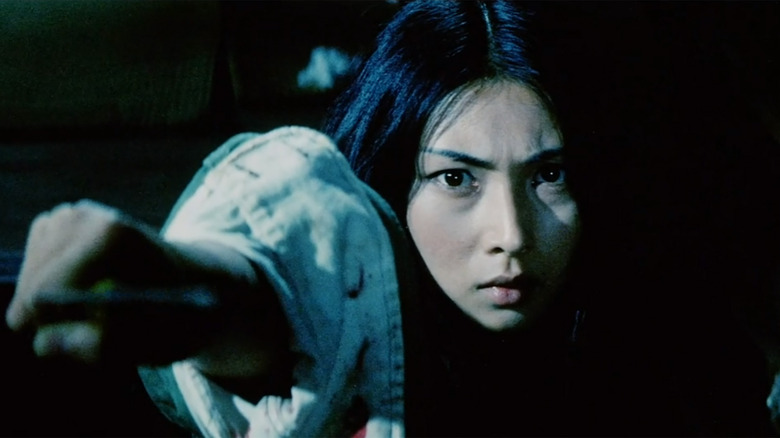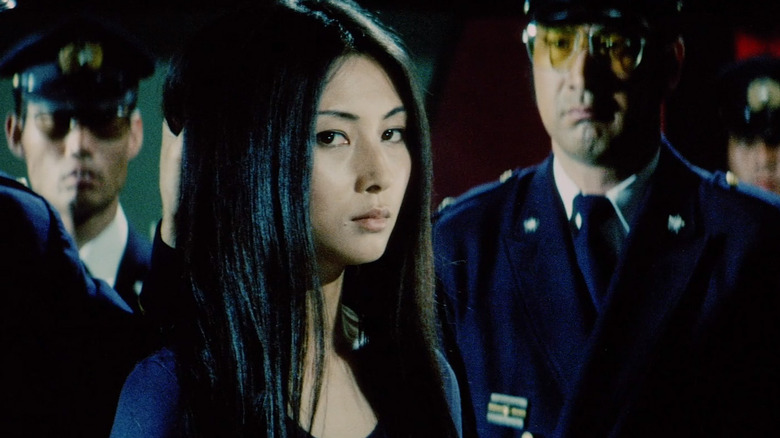The Daily Stream: Female Prisoner Scorpion: Beast Stable Is A Shockingly Timely Tale Of Female Vengeance
We may receive a commission on purchases made from links.
(Welcome to The Daily Stream, an ongoing series in which the /Film team shares what they've been watching, why it's worth checking out, and where you can stream it.)
Content Warning: "Female Prisoner Scorpion: Beast Stable" is an exploitation film from the 1970s and features depictions of rape, incest, abortion, and graphic violence. This piece will discuss some of these elements, so reader discretion is advised.
The Movie: "Female Prisoner Scorpion: Beast Stable"/"Joshuu sasori: Kemono-beya"
Where you can stream it: Prime Video through AMC+, free with ads on Tubi and Shudder
The Pitch: The "Female Prisoner Scorpion" films, starring Meiko Kaji as Nami Matsushima (better known as "Sasori" or "Scorpion") were a major influence on Quentin Tarantino's "Kill Bill", along with Kaji's other famous film, "Lady Snowblood." Both Snowblood and Scorpion are fierce female forces of vengeance, and it's easy to see the through-lines from Kaji's cold-eyed killers to Uma Thurman's Bride and Lucy Liu's O-Ren Ishii. The first three films in the "Female Prisoner Scorpion" series were all directed by the same man, Shunya Ito, and he worked closely with Kaji to bring the female-fueled story of revenge to the screen. On top of starring as Nami, Kaji also sings the haunting "Urami Bushi," or "My Grudge Blues," which serves as the series' theme. If the song sounds familiar, that's because Tarantino included it on the "Kill Bill Vol. 2" soundtrack.
The first two "Scorpion" movies are almost exclusively women-in-prison films, a sub-genre of exploitation that focuses on the physical, sexual, and emotional abuse of women in a prison setting, usually at the hands of the guards. After finally escaping her confinement at the end of the second film, Nami goes on the run. Unfortunately, she's seen almost immediately; the police try to stop her on the train, but she manages to cut off the arm of an officer who cuffs her to himself. The opening credits for "Female Prisoner Scorpion: Beast Stable" play as Nami runs through the train station and then the streets of the city with a severed arm flailing about on the end of a pair of handcuffs attached to her wrist. It's one hell of a mission statement, and that level of brutality never really lets up. She's a survivor, and she'll do it by any means necessary.
"Beast Stable" follows Nami when she's hiding out with a sex worker named Yuki (Yayoi Watanabe), who finds her trying to free herself of the severed arm in a cemetery. There are wanted posters for the dreaded Scorpion everywhere, but Yuki takes her in anyway. Nami ends up wanting to get revenge on the world for Yuki, who has an incestuous relationship with her brother, who has a developmental disability. She also meets another young sex worker who is forced to have an abortion, and decides to begin her streak of vengeance once more — this time targeting the criminal underworld that preys on disadvantaged women. The corrupt cops, yakuza, pimps, and madams better watch out, because this scorpion stings.
Why it's essential viewing
Maybe you haven't heard, but it's a nightmarish time to possess a uterus in the United States. The Supreme Court is looking to overturn Roe v. Wade, ending abortion protections nationwide and sending reproductive rights back to a more draconian era. The frequent discussions around abortion led me to thinking about the way its been depicted in movies, from the bittersweet scene in "Portrait of a Lady on Fire" to the extremely graphic depiction in "Enter the Void." Scorpion kept returning to the forefront of my thoughts, as she's a flawed but fascinating figure of female vengeance.
In the first two films, Nami gets revenge on those who hurt her personally, killing her rapists and those who enabled them. But in "Beast Stable," Nami becomes a symbol of revenge for all women. She takes on multiple facets of the patriarchy, fighting against the police, the yakuza, and more, and she does it all with her trademark cool. There are few femme action heroes that rank among the likes of Charles Bronson in "Death Wish" or Clint Eastwood in the "Dollars" trilogy, but Kaji as Scorpion is absolutely up there. She's beautiful, she's badass, and she's absolutely terrifying.
"Beast Stable" is inspired by gothic horror, with deep shadows, rain-soaked streets, and a villain who keeps pet ravens. It's still an exploitation film, so there's a fair amount of bloody violence and nudity, but there's something weirdly empowering in seeing Kaji slice her way through evil. The fact that the film doesn't shy away from its abortion subplots is also oddly refreshing, though one of the procedures depicted is not medical and is extremely graphic. There's a contrast between two women having abortions, highlighting the importance of choice: Yuki chooses to have an abortion when she realizes she is pregnant with her brother's child, while another young sex worker is forced to have one by the crow-keeping madam so she can get back to serving customers.
Yuki's experience is sterile and cold, and we see her reconcile with her feelings, but it's never depicted as traumatic, while the other young woman's experience is deeply traumatic. Autonomy over one's own body is everything, and it's not difficult to see the similarities between forced abortions and the forced pregnancies people are now staring down in the U.S. It's grisly stuff, and also a reminder of the differences between a sterile medical procedure and one performed elsewhere, as the young sex worker dies from internal bleeding. Outlawing abortions doesn't make them go away; it just forces people toward risky home procedures that can lead to severe injury, infertility, and death.
The "Female Prisoner Scorpion" films are problematic by their very nature as exploitation cinema, but they still have some fierce feminist ideas within them. Kaji's Scorpion is an anti-hero for the ages, a wild woman forged by trauma and set on revenge — and we could all use a little of her fire.

